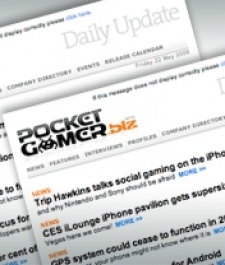Bottles of expensive red wine with Mark Rein apart, it has been another busy week in the world of PocketGamer.biz; the world of app stores, smartphone platforms, developments in mobile game making and assorted technology.
The biggest source of news came from Google's I/O conference in San Francisco, in which the company announced 100 million Android devices had been shipped, current hardware activations of 400,000 per day, over 200,000 apps available on Android Market, and over 4.5 billion apps downloaded.
Tablet OS Honeycomb was updated to Android 3.1, some features of forthcoming smartphone-tablet OS Ice Cream Sandwich were revealed, and Google said it had gained the agreement of 10 carriers and OEMs to update Android devices for the next 18 months, (assuming hardware is compatible).
At present, flavours of Froyo (Android 2.x) power the vast majority of devices - 91.4 percent according to Google.
The company completed its news drop with talk of better development tools, updated analytics to monitor in-app billing, and a refresh for the Android Market to aid app discovery.
Driving valuable downloads
Of course, with Apple continuing to restrict what companies can do on iOS - stopping iAd running on kid-oriented apps is the latest rumour - Android is gaining a lot of love from thirdparties.
GREE-owned OpenFeint announced its OFX micro-transaction and payment platform was coming to Android.
It's good news for developers and publishers who are seeing large download numbers but struggling to monetise. Korea outfit Com2uS said its Homerun Battle 3D has suffered 70 percent privacy on Android, forcing a switch to a free with IAP release.
IAPs made more headlines, with Capcom continuing to deal with the fallout of accidental purchases, now limiting in-app purchases in Smurfs' Village to five items per 15 minutes time period, while Epic's Mark Rein revealed 33.5 percent of Infinity Blade's total multi-million revenues have been generated by IAP.
Indeed, a survey from NPD found that mobile downloads represent half of all game content downloads.
Cash in motion
Following the money, more financial numbers were released this week. Korea publisher Gamevil saw its Q1 revenues up slightly to $5.9 million, while Japanese social mobile platform GREE posted massive Q3 sales of $198 million, up 77 percent year-on-year.
Things weren't so positive at Namco Bandai. Its Q4 mobile game subscriber numbers dropped 18 percent to 2.3 million.
There was plenty of M&A activity too.
Zynga hired the team behind open source iPhone engine cocos2d, Swedish mobile ad firm 24MAS acquired Irish content aggregator Selatra, GetJar picked up Infrinity, an app recommendation firm, and Nvidia bought UK mobile baseband processor specialist Icera for $367 million.
Turning to investment funding, US social gaming Funzio raises $20 million, while US mobile games ad platform Tap.Me got an undefined amount from Rockfish Brand Ventures.
Who's word is it anyway?
There's always lots going on in the world of app stores, although maybe we won't be allowed to call them that soon.
Apple is claiming rights to the phrase; something Microsoft and Amazon have countered. The opposition grew considerably this week with HTC, Nokia and Sony Ericsson, and Microsoft joining up to ask the EU to define the term as generic.
A decision either way won't impact Nintendo of course. Its app store for its 3DS console is called the 3DS eShop, and was confirmed as launching in North America on June 6, and Europe and Japan on June 7.
Nokia announced it would be setting up carrier-branded channels of its Ovi Store for Orange and Deutsche Telekom, while Samsung Apps is to be launched in China through online firm Sina.
Embrace fragmentation
It's clear the cross platform approach is the way for developers to grow their business. We discussed some of the enabling technologies in an executive briefing, while Scottish developer Tag Games revealed some figures of its own: 29 percent of its self published sales came from iOS, 26 percent from DSi, and 18 percent from PSN.
It's a philosophy that Gameloft is one of the best practitioners of - it's to release six games for Samsung Smart TV.
Things don't seem to going too well on Sony Ericsson's Android-based Xperia Play though. Rumours suggest its best-selling PSone games has sold less than 1,000 units.
The most surprising number of the week however came from Pyramid Research, which claims that, thanks to Nokia's future support, Windows Phone 7 will be the world's biggest smartphone platform by 2015.
Read my lips
But let's the end our roundup with a mystery. How easy it is to mistranslate the world 'suspend'?
Defined as 'the temporary cessation of activity', this is what Japanese platform holder DeNA said was happening to the development of new social games by its US division ngmoco.
"Ngmoco is concentrating its resources on preparations for the start-up of Mobage Global and has suspended the development of new social games", said a statement on its investor site, since changed to the less definite "concentrating its resources on preparations for the start-up of Mobage Global."
Indeed, ngmoco was quick to say use of the verb was a "translation/transcription error in the Q&A".
CEO Neil Young clarified thus: "Ngmoco's first party development is bigger and better than ever, with a host of new titles shipping throughout the year on iOS and Android, phone and tablet."
Until next week then... it's Suntory time.
PG.biz week that was: 100m Android devices, 33.5% of Infinity Blade's revenues from IAP, GREE's Q3 sales up 77% to $198m, and ngmoco is lost in translation
The past seven days' news compressed bite-sized























